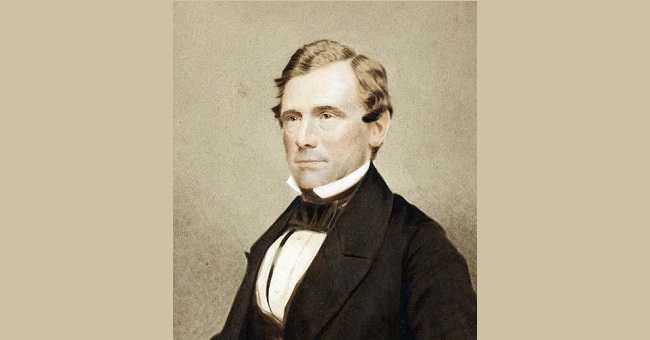The Stories of 42 Ministers Who Have Served Our Church
by Mike Roberts, Church Historian
The early ministers in our church were nearly all raised and trained in the East and eventually found their way to Cincinnati as prominent members of the Universalist pastorate. That pattern continued for the most part into the latter half of the 19th century.
Gerherdus Langdon Demarest
From 1861 to 1864, the church existed without a permanent minister. Visiting preachers, members of the church,, and Isaac Williamson provided sermons for Sunday services. After these three years, the membership hired Gerherdus Demarest as its minister. Demarest was born in New York City in 1816. After high school graduation he went to work with Harper’s publishing and while there was credited with settling the contract which led to the publishing of William Wadsworth Longfellow’s poems in their highly popular Harper’s Weekly. After 15 years with the firm, he relocated to Cincinnati to open his own publishing house. Already a declared Universalist, he became active in the First Universalist Church and served on its board while training for the ministry. He was hired as minister in 1864 but served only one year. Severe financial difficulties continued to plague the church and that may have caused him to lose a vote of the congregation to grant a second year. The vote was 37-28. Demarest returned to New York City assuming a pastorate of the large church there.
In 1875, he was selected to serve as Secretary to the General Assembly. This duty not only required him to organize the annual meeting but to supervise and attend all state general assemblies. This was an impossible task as many of the assemblies were held during the same time period hundreds of miles apart. Demarest did his best over the course of the next 30 years, retiring at age 88. It was estimated that he had traveled close to 250,000 miles during those thirty years. He also frequently served as a guest minister, delivering 250 sermons and also edited the “Sunday School Helper,” a national church publication. Demarest died at age 92 and is buried in Green-Wood Cemetery in Brooklyn. His son, Clarence, served as his assistant and for five years held the office of clerk of our Board of Trustees.
Everett Levi Rexford
After rejecting Demarest, the church was quick to hire a new minister, Everett Rexford. He had just graduated from St. Lawrence University and this was to be his first assignment. It was a difficult task as the church was still reeling from financial instability and many discussions were held about permanently closing the church. Rexford was born in Harmony, New York in 1842 and was the son of a Freewill Baptist minister. He served for four years in the Cincinnati pulpit, then left to serve in Columbus. He became involved with Buchtel College, a Universalist training school in Akron, first serving on their board of trustees and later as the college president. He was considered to be a leader of the liberal wing of the national church and wrote and spoke extensively. He delivered an address at the Columbian Exposition in Chicago entitled, “The Intrinsic Worth of Man.” He also served churches in San Francisco, Detroit, Akron and Roxbury, Massachusetts. He died at age 81 in Columbus.
Willard Spaulding
Willard Spaulding assumed the pulpit on January 30, 1870. He was born in Lempster, New Hampshire, a small town that produced no less than nine Universalist ministers. He had served in six New England towns before moving to Cincinnati. After two years in the Queen City, he retired at age fifty to his farm in New Hampshire. While here, he accomplished several important objectives. He increased the rate of pew rentals and at the same time convinced additional members to commit to new rentals. Within a year, the church had achieved solvency and with a small surplus purchased a new $700 organ. The church also hosted the Universalist national convention in the summer of 1870.
During his retirement, Spaulding frequently substituted for other ministers. He also ran as a candidate for the Labor Party for U.S. Congress, polling 13% of the vote. He had always been a strong abolitionist and was an outspoken proponent of temperance and labor reform. He also fought for the relief of the families of Civil War soldiers at a rally on their behalf. He opened the rally with a donation of $100 of his own money. By the end of the rally, over $5,000 had been raised. Spaulding died in West Peabody, Massachusetts, in 1892.
John Greenleaf Adams
When Adams took the pulpit of our Cincinnati church in 1873, he had already experienced forty years of Universalist ministry. He was born in New Hampshire in 1810 and was ordained in 1833. His pastorates prior to Cincinnati were spent entirely in New England.
Adams was well known as an author of biographies, hymnals and books on Universalist theology, among them The Christian’s Triumph Including Happy Death Scenes. In 1870 he participated in the installation service of Phoebe Hanaford, sharing the pulpit with the first female Universalist minister, Olympia Brown. During the early days of his tenure with us, the church discussed enlarging the Plum Street church or perhaps building a new edifice. However, difficult times befell the congregation as yet another financial panic had sent the country’s economy reeling. As a result, they often could not meet the payment of Reverend Adams’ salary. Eventually, he announced in 1876 that he was retiring and moving back to Massachusetts. However, there are records that he took a new ministry in Melrose, Massachusetts and served there until his death in 1887. After his retirement it took the church over a year to repay the past-due salaries they owed him.
James Murray Bailey
James Bailey assumed the pulpit of our Cincinnati church in January of 1877. He was 37 years old and the son of a Vermont Universalist minister. He had previously served in Troy, New York; Titusville, Pennsylvania; and Peoria, Illinois. Reverend Bailey had served in the artillery during the Civil War and was severely wounded at the Battle of Cold Harbor. His injuries caused him to permanently lose the use of his right hand.
During his term in Cincinnati, the congregation gave up on pew rentals as its major source of funding and adopted a system of member subscriptions, a plan similar to the pledge systems used today. After a year and a half serving as minister, Bailey resigned his position stating that there was no way the church could afford a full-time minister. He also complained of ill-health and the need to leave the ministry for a time in order to recoup his health. He left the church in August of 1878. Bailey never returned to the ministry, training instead as a mining engineer and pursuing that career for the remainder of his life. He died in San Francisco in 1921.
Upon his leave, Bailey’s sister Emma replaced her brother in the pulpit for the next ten Sundays. She went on to a long career as a Universalist minister and wrote a book, Happy Day, about her experiences.
James H. Hartley
James Hartley was ordained as a Universalist minister in 1877. He first served in Newburyport, Massachusetts and then began his ministry in Cincinnati in January of 1879. He stayed only slightly more than a year. Nothing is known of his life after he left Cincinnati.
Sumner Ellis
Sumner Ellis was a leading light of Universalism who had established a respected reputation in the pulpit. He had trained under Levi Ballou, the son of Hosea. He served churches in Boston, Salem, and Lynn, Massachusetts; Newark; and Milwaukee; and he came to Cincinnati from serving in Chicago. He agreed to only a six-month contract and during that time spent a great amount of it out of the city. He had also signed a contract to write a biography of Universalist minister Edwin Chapin. To add to his load, he was also grieving deeply for the recent death of his wife, Mary. It would seem that the experienced Ellis was brought to Cincinnati to help revive the church but not to commit to long term service.
Ellis stayed for his six months, then went about the task of writing the Chapin biography. He remarried to a widow, Addie Hall, and the two went on an extended tour of Europe. Unfortunately, on his return to the United States, he contracted typhoid fever and died in 1886.
Image: John Greenleaf Adams
Image source: Harvard Divinity School Library

